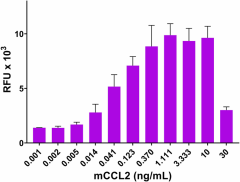- Regulatory Status
- RUO
- Other Names
- Monocyte chemotactic protein 1 (MCP-1)

-

Recombinant mouse CCL2 (MCP-1) chemoattracts Baf3-mCCR2 transfectants in a dose-dependent manner. The ED 50 for this effect is 0.025 - 0.165 ng/mL.
| Cat # | Size | Price | Quantity Check Availability | ||
|---|---|---|---|---|---|
| 578402 | 10 µg | $229.00 | |||
| 578404 | 25 µg | $411.00 | |||
| 578406 | 100 µg | $703.00 | |||
CCL2, commonly known as MCP-1, is a member of the CC β chemokine family. It is widely expressed in endothelial cells, smooth muscle cells, and monocytes in response to several atherogenic stimulants such as CD40 ligand, platelet derived growth factor (PDGF), interleukin-1β (IL-1β), and oxidized low density lipoprotein. Several recent in vivo studies have disclosed critical roles of CCL2 in atherosclerosis. In addition, CCL2 has been implicated in monocytic infiltration of tissues during several inflammatory diseases, and has been implicated in macrophage-mediated tumor growth suppression in mice. CCL2 has been shown to have direct effects on tumor cells in an autocrine and paracrine fashion in multiple cancers, including breast, lung, cervix, ovary, sarcoma, and prostate. In addition, CCL2 plays a key role in the regulation of MMPs during transmigration. CCL2 induces migration of MonoMac6 by induction of MMP2. CCL2 and CCL3/MIP-1α mediate firm adherence and (subsequent) transmigration of neutrophils via protein synthesis and secondary generation of leukotrienes and PAF, which in turn directly activate neutrophils in mouse cremaster muscle. CCL2 is induced from endothelial cells by MIF and from fetal skin fibroblasts by IL-17.
Product Details
- Source
- Mouse MCP1, amino acids Gln24-Arg96 (Accession# NM_011333) was expressed in 293E cells.
- Molecular Mass
- The 73 amino acid recombinant protein has a predicted molecular mass of approximately 8.531 kD. The DTT-reduced protein migrates at approximately 12 kD and non-reduced protein migrates at approximately 13 kD by SDS-PAGE. The N-terminal amino acid is Glutamine.
- Purity
- >98%, as determined by Coomassie stained SDS-PAGE.
- Formulation
- 0.22 µm filtered protein solution is in PBS.
- Endotoxin Level
- Less than 0.01 ng per µg cytokine as determined by the LAL method.
- Concentration
- 10 and 25 µg sizes are bottled at 200 µg/mL. 100 µg size and larger sizes are lot-specific and bottled at the concentration indicated on the vial. To obtain lot-specific concentration and expiration, please enter the lot number in our Certificate of Analysis online tool.
- Storage & Handling
- Unopened vial can be stored between 2°C and 8°C for up to 2 weeks, at -20°C for up to six months, or at -70°C or colder until the expiration date. For maximum results, quick spin vial prior to opening. The protein can be aliquoted and stored at -20°C or colder. Stock solutions can also be prepared at 50 - 100 µg/mL in appropriate sterile buffer, carrier protein such as 0.2 - 1% BSA or HSA can be added when preparing the stock solution. Aliquots can be stored between 2°C and 8°C for up to one week and stored at -20°C or colder for up to 3 months. Avoid repeated freeze/thaw cycles.
- Activity
-
Recombinant mouse CCL2 (MCP-1) chemoattracts Baf3-mCCR2 transfectants in a dose-dependent manner. The ED
50 for this effect is 0.025 - 0.165 ng/mL. - Application
-
Bioassay
- Application Notes
-
BioLegend carrier-free recombinant proteins provided in liquid format are shipped on blue-ice. Our comparison testing data indicates that when handled and stored as recommended, the liquid format has equal or better stability and shelf-life compared to commercially available lyophilized proteins after reconstitution. Our liquid proteins are verified in-house to maintain activity after shipping on blue ice and are backed by our 100% satisfaction guarantee. If you have any concerns, contact us at tech@biolegend.com.
-
Application References
(PubMed link indicates BioLegend citation) -
- Mitchell LA, et al. 2013. Int Immunopharmacol. 15:357. PubMed.
- Product Citations
-
Antigen Details
- Distribution
-
CCL2 (MCP-1) is secreted by fibroblasts, endothelial cells, smooth muscle cells, tumor cells, phytohemaglutinin stimulated mononuclear cells, TNF-α stimulated osteoblastic MC3T3-E1 cells.
- Interaction
- Monocytes, memory/ activated T cells, NK cells, myeloid dendritic cells, neutrophils, astrocytes, mesangial cells, and bone marrow endothelial cells.
- Ligand/Receptor
- CCL2 mediates its cellular effects primarily through the CCR2 receptor.
- Cell Type
- Hematopoietic stem and progenitors
- Biology Area
- Cell Biology, Neuroinflammation, Neuroscience, Signal Transduction, Stem Cells
- Molecular Family
- Cytokines/Chemokines
- Antigen References
-
1. Loberg RD, et al. 2007. Cancer Res. 67:9417.
2. Gregory JL, et al. 2006. J. Immunol. 177: 8072.
3. Qiu Z, et al. 2009. Immunobiology 214:835.
4. Reichel CA, et al. 2009. Arterioscler. Thromb. Vasc. Biol. 29:1787.
5. McQuibban GA, et al. 2002. Blood 100:1160. - Gene ID
- 20296 View all products for this Gene ID
- UniProt
- View information about CCL2 on UniProt.org
